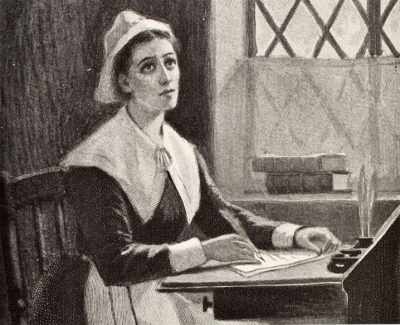
Born in England to Thomas Dudley, a soldier of the British Empire, Anne had a comfortable upbringing. She benefited from the Elizabethan tradition of educating girls, and was tutored in literature and history in Greek, Latin, Hebrew and English.
She was married at the age of 16 to Simon Bradstreet, and shortly after, in 1630, Thomas, Simon and Anne set sail for America. The journey took three months and the ship was part of a fleet of 11 carrying around 1,000 Puritans to America. The ship docked at Salem, Massachusetts, and the squalor and poverty there was a shock to Anne, who grew up in an estate and spent much of her time in libraries, reading books. The family moved constantly to newer places where Simon could wield more political power. Anne had eight children in 10 years.
Not much is known about her personal life beyond this, except her poetry and personal musings. She wrote epitaphs for her father and mother, and her poems often spoke of her husband and how much she missed him when he was out doing his duties as a powerful Puritan.
Her poetry was taken back to London by her brother-in-law, and these were published as The Tenth Muse Lately Sprung up in America. These were the only works published during her lifetime. Others, more personal and original with her unique style, were published after her time. Anne died at the age of 60.
Anne’s constant struggle between her love of the world and desire for eternal life was expressed her poem “contemplations”:
Then higher on the glistering Sun I gaz’d
Whose beams was shaded by the leafy Tree.
The more I look’d, the more I grew amaz’d
And softly said, what glory’s like to thee?
Soul of this world, this Universe’s Eye,
No wonder some made thee a Deity:
Had I not better known (alas) the same had I.
Anne’s life has always been linked to the lives of her husband and father, who were prominent figures and even aided in founding the Harvard University. Though she appreciated their love and protection, she wrote, “any women who sought to use her wit, charm, or intelligence in the community at large found herself ridiculed, banished, or executed by the Colony’s powerful group of male leaders”.
Picture Credit : Google

